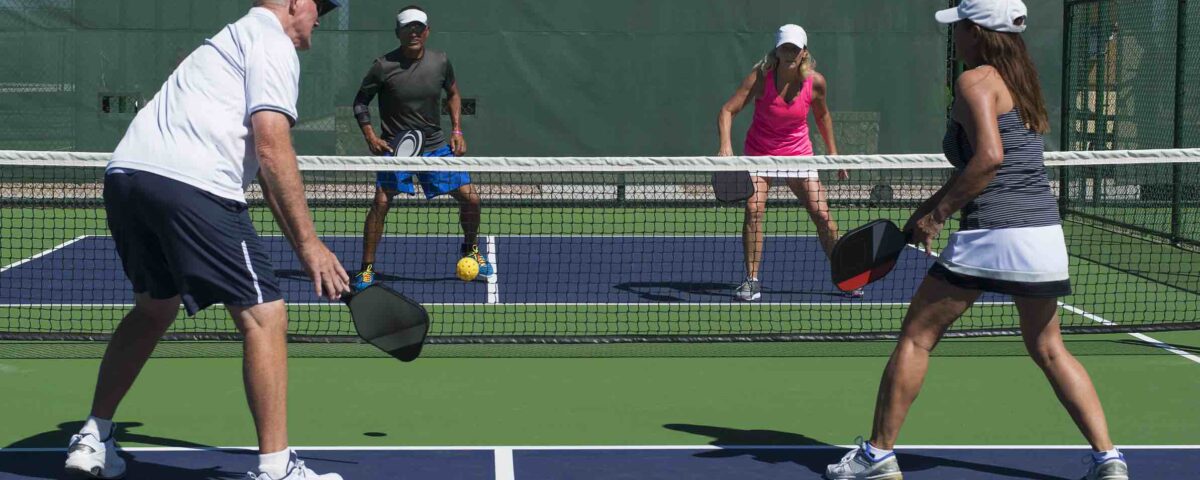
2023 Honors, Awards and Accolades
December 11, 2023
Broken Finger Treatments
August 20, 2024The recent surge in pickleball’s appeal has unfortunately been accompanied by a significant increase in sport-related injuries. This sport, a combination of tennis, badminton, and table tennis, has witnessed a dramatic rise in related injuries, particularly fractures, which have escalated 90 times from 2002 to 2022, primarily among players aged 60 to 69, as noted in a recent study.
“In pickleball, we frequently encounter muscle and tendon strains and sprains, knee ligament injuries, tennis elbow, ankle sprains, Achilles tendonitis, and inflammation of the rotator cuff,” explains Andrew Jimenez, MD, an orthopaedic surgeon and sports medicine specialist at Yale Medicine.
With pickleball attracting a broader demographic, the average player age stands at approximately 35, according to the Association of Pickleball Professionals. Dr. Jim Hsu, another Yale Medicine orthopaedic surgeon and sports medicine specialist, points out that injuries, especially those from overuse, can affect players of any age and skill level.
“Many view the sport as low-key and straightforward because it seems to require little preparation and can be played extensively over weekends,” Dr. Hsu comments. “However, this perception is misleading as the sport demands rigor, and the physical strains are significant. Players should progressively increase play intensity and frequency to avoid injury.”
Pickleball involves players using paddles to hit a perforated plastic ball over a net, in a game format similar to tennis but on a smaller court, which makes the game appear easier and more fun to some.
“There are several preventive measures that can be taken to reduce the risk of injuries,” says Dr. Jimenez.
We delve further into injury prevention with Drs. Hsu and Jimenez discussing several key strategies:
- Proper Warm-Up: Dr. Jimenez advises spending 5 to 10 minutes warming up to elevate your body temperature and boost blood flow to your muscles. This preparation involves dynamic stretches such as lunges, arm circles, and knee lifts, along with a brief jog or some jumping jacks. Following the game, he recommends light static stretching and a gentle walk to cool down.
- Gradual Introduction to the Game: Dr. Jimenez stresses the importance of listening to your body and resting as necessary. “If you’re feeling tired, especially just starting out or early in your game, take a short break to avoid pushing yourself to the point of exhaustion, which increases injury risk,” he advises.
Dr. Hsu adds, “It’s crucial to manage your eagerness and understand the physical aspects of pickleball. Although often seen as easy and enjoyable, akin to playing ping-pong at a party, it is much more strenuous.”
He also warns against doing too much too quickly, which can lead to overuse injuries. He commonly sees conditions such as “pickle elbow,” similar to tennis elbow, which involves pain from repetitive wrist and arm movements. “This can affect daily activities like typing or even holding a coffee cup,” Dr. Hsu explains. “Easing into the sport allows your body to adapt to new demands without overstrain.”
- Invest in Appropriate Footwear and Equipment: Dr. Jimenez emphasizes the importance of wearing supportive footwear suited to the playing surface, whether it’s indoor, on concrete, or grass courts. He suggests tennis shoes for their grip and support, which help prevent falls and slips.
Dr. Hsu points out the need for suitable paddles too. “Pickleball paddles come with different grip sizes. It’s essential to choose one that fits your hand well to avoid muscle strain,” he says, recommending a visit to a sporting goods store for proper fitting.
- Cross-Training: Engaging in varied physical activities helps build overall fitness, which supports your pickleball performance. “Incorporate running, swimming, or cycling into your routine,” suggests Dr. Jimenez. “Strength training for your arms, shoulders, and core, as well as exercises to improve balance and reflexes, are also beneficial,” adds Dr. Hsu.
- Recognize When to Seek Medical Advice: While minor pains from playing can often be managed with rest, ice, and over-the-counter pain relief like NSAIDs, Dr. Jimenez advises prompt medical consultation for severe or persistent symptoms. Dr. Hsu recommends consulting a primary care physician, a sports medicine specialist, or a physical therapist for acute injuries or unrelenting pain.
“Engaging in pickleball is highly encouraged,” Dr. Jimenez concludes. “It’s a fantastic sport for staying active and enjoying exercise, but players must approach it with the right preparation and precautions.”
In summary, while pickleball offers fun and fitness, understanding and mitigating the risks through proper preparation, equipment, and training can ensure a safer and more enjoyable experience for all involved.


